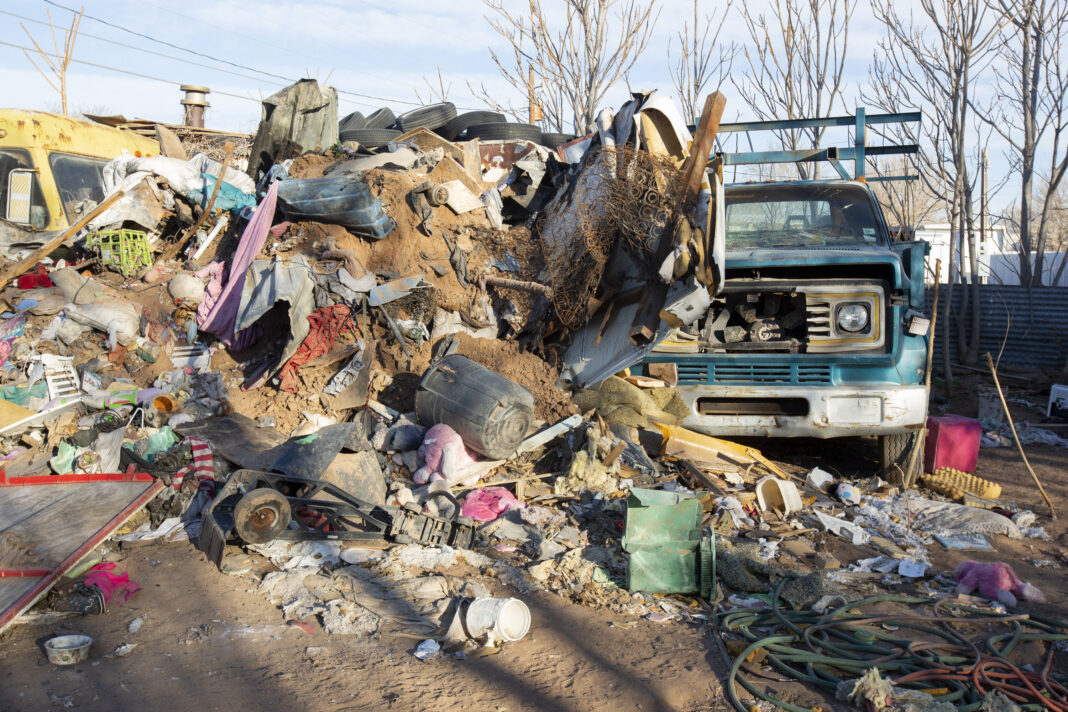On paper, West Odessa has one landfill. Rickey George and his crew of six spend their days trying to eliminate the countless others that have sprung up over the years.
Right now, the worst one is on Avenue I behind a private residence, George, Ector County’s environmental enforcement director, said.
There are multiple piles of garbage literally taller than the junked out trucks dotting the quarter acre yard. Tires, propane tanks, shoes and a myriad of other discarded artifacts are mixed in with the mountains of dirt. Broken glass, nails, dog feces and various other pieces of trash obscure what, if any, pathways and lawn used to exist.
A dilapidated structure on the property recently caught fire and Odessa firefighters were forced to navigate a veritable minefield of debris to extinguish it, George said.
Many don’t understand, but it’s not just unsightliness he and his colleagues are battling, George said.
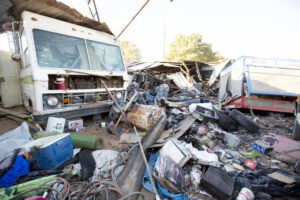
The trash heaps in West Odessa are a health and safety issue.
“Yeah, it looks bad. But well, what does it provide? It provides a harbor for mice, and rats and mosquitoes and insects. OK, what eats mice? Snakes. Alright. So these are health safety issues. Rats and mice carry diseases, right? All kinds of diseases, mice and rats carry. Mosquitoes? They’re the serial killers of the world, right? Zika Virus, West Nile, you name it, they carry it,” George said.
As George prepares to leave the house, a next-door neighbor stops to thank him for his efforts. It seems the front yard of the house used to look as bad as the back. He tells George the family of the late owner offered to sell him the house and property for $10,000.
“I told them no because it would cost me $40,000 to clean it up, plus I just don’t have the time,” he said.
He also tells George he’s killed seven rattlesnakes in his yard so far, rattlesnakes attracted to the mice making their homes in the mess.
Maybe the price will come down some more, the neighbor said hopefully before going on his way.
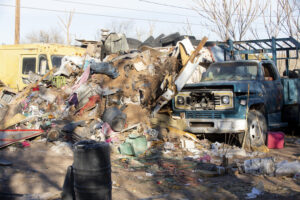
THE PROBLEM
Ector County is 900 square miles. The area west of Loop 338 is inhabited by anywhere from 50,000-80,000 people, George said. Some were desperate to find someplace to live during oilfield boom-caused housing shortages. Others just like their space, but either way they plopped down trailers despite the lack of water and sewage systems and trash service.
Some of those who live in the area pack up their trash and take it to the landfill, George said. Others open up their doors and toss it outside.
Up until 2011, there was no one to stop them.
Eleven years ago, George was as an investigator with the Ector County Attorney’s Office after having spent more than a decade as a law enforcement officer in Odessa and the Austin area.
Susan Redford, who was the Ector County judge back then, asked George if he’d be willing to take on the job. The county’s health department had hired someone to start addressing illegal dumping, but he’d only lasted a year.
George soon discovered the state actually has illegal dumping laws, but of Texas’ 254 counties only a dozen or so enforce them and only a couple do so full time.
“I’d never even heard of these laws. I was like, ‘I’ve been a police officer for a long time. Why haven’t I heard of these environmental laws?’ I wasn’t taught these in the police academy. Prosecutors aren’t taught these in law school,” George said.
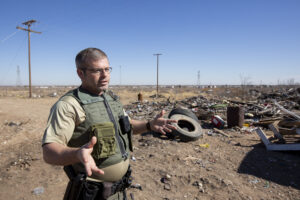
NEW APPROACH
George immediately went to work, determined not to make the same mistake so many other cities and counties do.
“If you have tall weeds in your yard, what do they do? They send you a dirty letter. They call them notices of violation … but what you’re doing is you’re sending a crook a letter to say, ‘Please stop breaking the law.’ OK, well, that doesn’t work. It’s proven not to work,” George said.
Instead of writing letters, George began issuing warrants and making arrests.
Technically, most people can be arrested on felonies based on the weight of the trash they dump, but George said 98% of those they encounter are arrested on misdemeanor crimes and few end up being locked up behind bars.
“Most of the people that we encounter, we just tell them, ‘OK. We’re gonna issue a warrant for your arrest.We’re not going to come get you. We’ll call you when the warrant’s ready and you can go get your bond ahead of time and just turn yourself in at the jail. Have your bond ready, so that it’s just kind of in and out process,” George said. “We make it as easy on them as we possibly can. That’s 99% of our cases.”
Since 2011, the county increased George’s budget and staff. As of this month, George has four officers, having finally been able to fill two open positions. He also has an administrative assistant and two men who travel throughout the county filling up a large dump truck purchased last year.
Thanks to the additional staffing and technology, the county has had some success in recent years, George said.
The technology? Cameras that have been hidden around the county that capture offenders in action.
Not only are fewer people dumping, but George said the county’s largest pile of illegally dumped tires has been cut in half because of a reparation program they’ve implemented.
When most people are arrested, they are told that if they pick up whatever they’ve dumped and some tires before their first court date and if they provide documentation they took the items to a legal disposal facility, investigators will ask District Attorney Dusty Gallivan’s office to dismiss the case against them, George said.
Most take them up on the offer.
In fact, there was once more than 100,000 tires at West 52nd Street and Oak Hill; roughly half of them are gone now, George said.
Once they’re all gone, George said they’ll be asked to pick up tires dumped on Rawhide Road.
The tires were left at both sites by a man who served 180 days in jail for illegal dumping, George said. The man ran a tire shop, charged residents a $6 per tire disposal fee and instead of disposing of them the proper way, took them and dumped them, he said.
Unlike the location on 52nd and Oak Hill, the Rawhide Road location is heavily populated, George said.
“This is the pile I’m going to work on next because if this thing catches on fire, this whole neighborhood’s gonna go up,” George said. “You’ve got to think there’s no water. There are no fire hydrants and a fire truck only has like 700 gallons on board. This one scares me. This pile right here scares me a lot.”
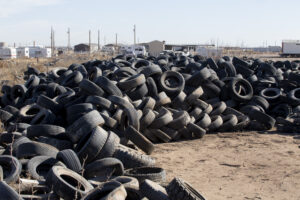
BIGGEST ISSUES
Ector County has a huge problem with illegally dumped tires, George said. People simply don’t want to pay to dispose of them properly and there are few companies willing to recycle them because it actually costs more money to break tires down and re-purpose them than it does to create an entirely new tire, he said.
The Texas Commission on Environmental Quality estimates Ector County has 2.5 to 5 million tires on the ground, but the numbers are way off, George said.
“Those tires are just the ones that they know about. We’re out here every day. We know about much more than what they know about and we’re estimating that number’s closer to about 8 million,” George said. “Our county is the worst and we’re talking about Dallas, Fort Worth, Houston, San Antonio, all these major metropolitan areas and this county is the worst one for tires.”
Mattresses and couches are also huge problems, he said.
He and his staff, who work four, 10-hour shifts weekdays, check on known dump spots regularly, respond to calls from residents and look for random dump sites, George said.
If they spot a mattress on the side of the road, it’ll get picked up, he said.
“Trash attracts trash. You don’t have to water it, you don’t have to fertilize it. It’ll grow. There’ll be a couch there tomorrow and then it’ll be tires. So it’s the whole broken windows theory, you know, you got to keep things clean, because the trash attracts trash,” George said.
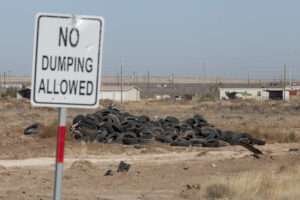
IDEAS
Because West Odessans don’t have regular trash service, the county periodically allows residents to drop off bulky items for free, George said. The turnout is typically “massive” and sometimes the county actually comes out ahead when the scrap metal they collect at the event is sold for more than the cost of the event.
Those events alone are not enough to keep on top of the problem, however, so George said he is constantly trying to think of ways to combat the issue.
Although he knows the county doesn’t want to get into the trash business, George would like to convince the commissioners court to purchase 30-yard “bathtub” containers that hold five tons of trash each. Each of the tubs could then be rented out and the cost of the program would pay for itself in rental fees, he said.
While theoretically residents can rent their own trash containers, private companies can’t keep up with the demand and tend to charge a large sum, George said.
“The City of Odessa generates a lot of revenue out of renting trash containers, over a million dollars the city makes renting the big trash containers,” he said.
George has also been mulling over the idea of creating a citizens collection center where people could drop off their old couches, mattresses and the like for a small fee on the weekends at South Tripp Avenue and Boles Road, property the county already owns.
“If we charge $5 or $10 for a couch or a mattress, by the time we reach a ton, we’ve covered our disposal cost and they don’t have to wait in line at the landfill,” George said. “I think it’s a good idea. We have the spot to do it, we have the land to do it. We would need some concrete and construction work done, but it would provide citizens an opportunity and a place to go to get rid of their mattresses and couches for a very, very cheap rate. That’s what they voted on for the sales tax was to stop illegal dumping. This is an approach to do it, provide them with an alternative.”
He’d also like to have a used oil collection center, George said.
If people had an alternative, George said perhaps the county wouldn’t see properties like the one on Avenue I.
“People think I’m a mean cop, right? I throw everybody in jail, but no, I’m trying to find a way to help people out here and that’s to give them an alternative,” George said.
Although, they’ve never done it before, theoretically the county could go through a process that would allow them to knock the house down, raze the property and place a lien on it. However, the county doesn’t have a big enough excavator to get the job done, George said.
“So I know the commissioner was getting a lot of neighborhood complaints about it, but I honestly don’t have an answer for how we’re going to do this,” George said.
George is also searching for ways to help educate people about illegal dumping and encourage others to report when they see it. He’d love to see a nonprofit group go out on weekends, take pictures of illegal dump sites and send them to the county so there are more “eyes and ears” in the community.
He often encounters people who appear to be shocked they’ve broken the law.
”A lot of people get confused. ‘I can do what I want on my own property.’ I’m like, ‘Can you sell cocaine on your own property? Can you commit murder on your own property?’ You can’t break any other state law on your own property. Why would you be able to illegally dump on your own property? But a lot of people think they can,” George said.
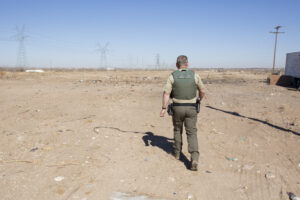
PROGRESS
Slowly but surely, George thinks he and his staff are changing the culture of Ector County.
“I think we’re improving the quality of life, which is our mission statement, to improve the quality of life for citizens in Ector County by enforcing environmental laws,” George said. “And just as you witnessed, a citizen came up and expressed his gratitude for approaching an issue that nobody else has ever done in Ector County. That is what we pride ourselves on. We took on a job that everybody refused to do.”
They’ve made such a name for themselves, George said he routinely gets calls from counties around the state asking for advice and he was invited to speak at a statewide commissioners’ meeting about his work.
“I didn’t think talking trash would be that big a hit, but oh my gosh, there was a line out the door to talk to me after it,” George said. “So I think the success in the last several years has not been only locally, but statewide. The recognition we’re getting statewide in like Fort Worth. They’re huge and their units call us for guidance. It’s things like that I identify as success stories.”

